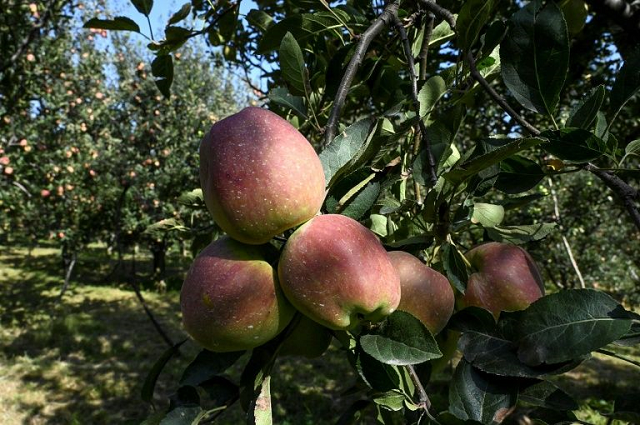Why are Kashmiri farmers letting their apple orchards rot?
Amid growing bitterness towards India, farmers in IOK are deliberately sabotaging a crop vital to local economy

More than half of Kashmiris are engaged directly or indirectly in apple cultivation. PHOTO: AFP
New Delhi has deployed tens of thousands of extra troops since early August, when it scrapped the occupied region's decades-old semi-autonomous status, and brought in a communications blockade that cut off Kashmiris from the outside world.
Political leaders and thousands of civilians have been arrested, with allegations of torture and abuse levelled at authorities - which deny them - and protests have since raged.
Either in anger or at the urging of Kashmiri freedom fighters, farmers have joined in the rebuke of India's actions by deliberately sabotaging a crop vital to the local economy.
Billboards in Times Square highlight Kashmir issue
The fertile Himalayan region usually sells hundreds of millions of dollars worth of apples each year, and more than half of Kashmiris are engaged directly or indirectly in cultivation.
At one orchard in central Shopian district, Ghulam Nabi Malik and his brother usually sell 7,000 boxes of apples a year for markets and kitchen tables across India, earning them some seven million rupees (nearly $100,000).
Their land is now idle, with branches sagging under the weight of unpicked fruit. "Let it rot on the trees," Malik said.
Amid the latest unrest, Malik told AFP that harvesting would allow the Indian government "to tell the world that everything is fine in Kashmir".
And everything, he says, is far from fine.
Freedom fighters have circulated letters and stuck posters outside mosques, appealing to orchard owners not to harvest and instead join the "resistance".
"Apple growers and students are ready to sacrifice this year and not betray the blood of martyrs," reads one such notice.
Many farmers say they are willing participants in the campaign, although there have been threats and one orchard owner - a local bigwig close to Prime Minister Narendra Modi's party - was attacked.
In one village, a former police officer who deserted to join a rebel group set fire to empty boxes his own family had bought for packing fruit.
Fuel stations have also faced pressure and trucks needed to transport the fruit have been forced off the roads.
But locals insisted to AFP that these were not the reasons for abandoning what they say is a bumper crop this year.
"To leave the ripe apples rotting on the trees is the only form of protest we can do under the current circumstances," Malik said.
People say they are frightened of Indian security forces, who often haul away young men from villages at night.
Modi claims that with tens of thousands killed in occupied Kashmir's 30-year-old anti-India insurgency, his government has acted to end "a vicious cycle of terrorism, violence, separatism and corruption".
New Delhi claims most Kashmiris support its move but are scared to say so out of fear of "terrorists" backed by Pakistan, which has fought two wars with India over Kashmir.
The state government has tried to resolve the situation with the apples by promising security for growers and offering to buy apples directly.
It insists these measures are working.
Guterres reaffirms support to PM Imran on Kashmir issue
Deliveries of apples to markets were only down by around 25 percent, said Metharam Kriplani of the New Delhi-based Kashmir Apple Merchants Association.
The "biggest problem" facing buyers was the lack of phone lines as a result of the region's communications lockdown, he said.
But growers that spoke to AFP have refused the offer of government support, and fruit markets in Shopian and elsewhere in Kashmir are empty - despite some traders claiming that local authorities attempted to browbeat them into opening as normal.
The authorities "threatened that they would destroy the shops (at the market) if we didn't open. But the market is deserted," said Bashir Ahmad Bashir, head of the local fruit-growers association.



















COMMENTS
Comments are moderated and generally will be posted if they are on-topic and not abusive.
For more information, please see our Comments FAQ